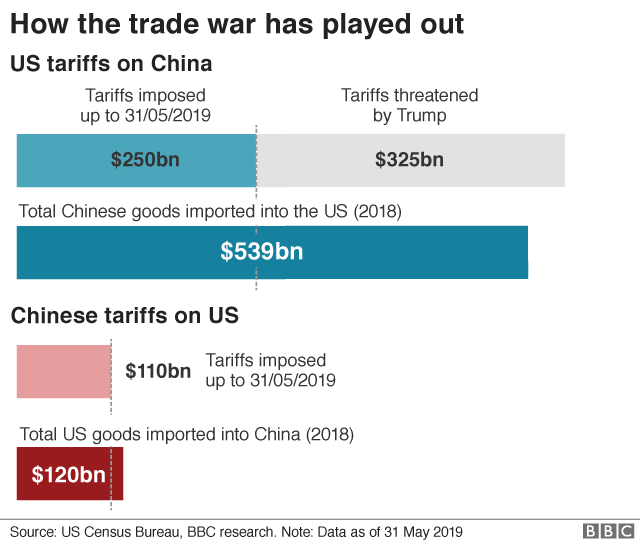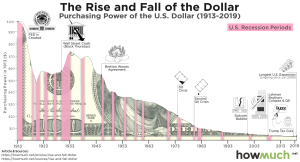The prospect of a China tariffs backlash looms large as President Trump signals his intention to impose substantial tariffs on Chinese goods, a move that could ripple through the U.S. economy and its international relations. Economists warn that such trade war consequences may lead to increased prices for American consumers, complicate the global supply chain, and disrupt existing trade partnerships. This heightened tension raises questions about how Beijing will respond to these tariffs and the impact on U.S. economic stability. The implications of Trump’s tariff policy could resonate beyond immediate financial pain, potentially alienating traditional allies and pushing them closer to China. As the situation unfolds, understanding the economic dynamics at play will be crucial for businesses and policymakers alike.
As the trade landscape becomes increasingly contentious, the looming threat of punitive tariffs on imports from China has sparked a wave of concern among economists and traders. The possible backlash against such tariffs not only threatens to shake the foundations of U.S.-China relations but also casts a shadow on the broader economic implications poised to impact American consumers and industries. In light of escalating trade tensions, many are reconsidering the delicate balance of the global supply chain and the strategic responses that China might deploy. Should these tariffs be vigorously enacted, experts suggest that the resulting economic repercussions could strain alliances previously held strong with nations like the EU and Japan. The intricate web of international trade is at risk of unraveling should a full-blown trade war ensue, demanding a re-evaluation of diplomatic and economic strategies moving forward.
The Economic Impact of China Tariffs on the U.S.
Imposing tariffs on Chinese goods, as proposed by President Trump, could have significant repercussions for the U.S. economy. Tariffs are essentially taxes on imported goods, which, if increased significantly—as Trump suggested—can lead to higher prices for consumers. This inflationary pressure can affect the purchasing power of everyday Americans, making essentials more expensive. Moreover, economists warn that a resurgence in tariffs could exacerbate existing issues in the American economy, leading to a slowdown in growth and potentially triggering a recession.
Additionally, tariffs disrupt supply chains, which have become increasingly globalized and interconnected. Many U.S. companies rely on Chinese manufacturers for critical components of their products. By imposing tariffs, the cost of these components would rise, causing companies to either absorb costs or pass them onto consumers, which could lead to decreased consumer spending and economic instability. This complexity illustrates how deeply intertwined the U.S. and Chinese economies are and highlights the potential systemic risk that such a trade policy might bring.
Backlash from China: Risks and Responses
The proposed tariffs are likely to elicit a strong reaction from Beijing. China’s economy is already dealing with significant challenges, including a sluggish housing market and declining consumer demand. If the U.S. were to impose tariffs, it would not only strain economic relations but could also lead China to retaliate in ways that could further spiral into a trade war. Such escalations could result in widespread market volatility and disrupt global supply chains, creating challenges for all countries involved, including those not directly linked to the U.S.-China trade situation.
China’s response could include seeking new trading partners or strengthening ties with existing ones, such as those in the European Union or Southeast Asia. This would not only provide them with alternative markets but could also help to gain political leverage against the U.S. In this fast-evolving geopolitical landscape, China may capitalize on economic friction to create new alliances, thus undermining U.S. influence globally.
Trade War Consequences for Global Supply Chains
The introduction of tariffs on Chinese imports poses a risk of disrupting the established global supply chains that many industries depend on. Over the years, companies have optimized their manufacturing processes to leverage international supplies for efficiency and cost-effectiveness. A sudden shift in tariff regulations could lead to immediate operational challenges, forcing companies to scramble for alternatives or even rethink their entire logistics strategies.
Moreover, attempting to pivot supply chains to other countries can be a lengthy and complicated process. Nations like Vietnam and India may be considered for increased manufacturing roles, but moving production is not just about geographic location; it requires substantial investment in infrastructure and technology to meet the production standards needed for intricate and high-quality goods. This disruption could ultimately lead to higher costs and longer delivery times for U.S. consumers, exacerbating the inflationary effects of tariffs.
The Strategic Repercussions of Trump’s Tariff Policy
Trump’s proposed tariffs may have unintended strategic repercussions that extend beyond mere economics. If the U.S. imposes broad tariffs not only on Chinese goods but also on goods from Mexico and Canada, it could inadvertently drive these nations closer to China. By fostering a sense of shared economic struggle against U.S. tariffs, China may find an opportunity to strengthen its diplomatic and trade relationships with these countries, thereby altering the balance of power in global trade relationships.
Furthermore, such a strategy could complicate U.S. foreign relations, particularly with traditional allies. The prospect of strengthening ties between China and other major economies could create a coalition that undermines American interests internationally. Such dynamics highlight the potential for tariffs to serve not just as economic tools but as significant geopolitical strategies that could reshape global alliances in impactful ways.
Challenges to U.S. Economic Stability
The potential for tariffs to destabilize the U.S. economy is a crucial factor that warrants serious consideration. The imposition of 60% tariffs on Chinese imports could lead to significant inflationary pressures, causing basic goods to become more expensive for American families. This price increase impacts not just consumer choice but also the overall economic health of the nation, particularly affecting lower and middle-income households who may not have the flexibility in their budgets to absorb the cost.
Additionally, if American companies face increased costs due to higher tariffs, many might pass these costs onto consumers, leading to a cycle of inflation that can diminish consumer confidence and spending. Such an environment would prompt concerns about an economic downturn, which would further strain relationships within the U.S. economy as businesses adjust to changing consumer behavior in response to heightened prices.
Exploring Alternative Markets for U.S. Imports
In the wake of increasing tariffs on Chinese goods, a natural question arises: where can the U.S. turn for alternative sources of supply? While countries like Vietnam and India are often mentioned as potential replacements, the transition is far from straightforward. These nations may lack the necessary infrastructure and technical capabilities to fully replace China’s manufacturing output, particularly in high-value sectors such as technology.
Additionally, the rapid shift to alternative suppliers may also lead to increased competition within these emerging markets, which can stir geopolitical tensions and complicate the supply chains further. Identifying and developing these new trade partners takes time, and during this transition period, U.S. companies and consumers may continue to feel the effects of tariffs, reinforcing the very economic problems they seek to resolve.
The Role of Allies Amidst Tariff Escalations
As tensions escalate between the U.S. and China due to tariff disputes, the role of U.S. allies becomes increasingly critical. Countries such as Japan, Canada, and those in the European Union share economic ties with both the U.S. and China, making them important players in the unfolding trade narrative. These nations face the challenge of balancing their economic interests while also dealing with the ripple effects of U.S.-imposed tariffs.
For example, if well-established allies begin to feel the pinch from U.S. tariffs, they may seek solace in strengthening ties with China to cushion the impacts of American trade policies. This balancing act could further shift the global trade landscape, where U.S. interests could be forfeited if allies prioritize their own economic stability over long-standing relations with the U.S.
Long-Term Impacts of Economic Decisions
The long-term impacts of trigger-happy tariff policies cannot be overstated. The potential for tariffs to alter consumer behavior and disrupt markets is significant, leading to an array of economic consequences that might take years to fully manifest. Economies are interconnected; thus, decisions made in isolation, such as unilateral tariffs, may reverberate through global markets, affecting transactions and investments far beyond immediate U.S. borders.
Consequently, a more cautious and strategic approach is needed to navigate these complex waters. The possibility of fostering better relationships through negotiation rather than confrontation could yield benefits for not just the U.S. but also create avenues for cooperation that may help avert future trade wars. Reevaluating the impact of tariffs and seeking multi-lateral solutions could ultimately be more advantageous in ensuring economic stability and unity among allies.
Negotiating Trade Deals to Mitigate Economic Fallout
Negotiating sensible trade deals can offer a pragmatic solution to the harsh outcomes of aggressive tariff policies. While tariffs are traditionally viewed as a means to protect domestic industries, they can simultaneously disrupt not just local economies but also undermine global partnerships. A well-crafted trade deal can allow the U.S. to assert its trade interests without inciting further disputes or damaging alliances.
By focusing on collaborative approaches and emphasizing fair competition, the U.S. can maintain access to vital markets while ensuring that allies feel secure and supported. The potential long-term benefits of diplomacy in trade dealings could smooth out immediate economic tensions, presenting a more robust framework for dealing with future trade challenges.
Frequently Asked Questions
How could the China tariffs backlash affect the US economy?
The China tariffs backlash could significantly impact the US economy by leading to higher prices for consumers, as tariffs on Chinese imports increase production costs. This, in turn, can result in inflation and reduce disposable income for American households. Moreover, the disruption of global supply chains, caused by the trade war consequences, might lead to delays in product availability and increased reliance on alternative, possibly more expensive sources, further straining the economy.
What are the potential trade war consequences of imposing high tariffs on China?
Imposing high tariffs on China may lead to numerous trade war consequences, including reduced amounts of Chinese goods in the US market, which can create shortages. Additionally, it may push China to seek new trade partnerships, thus weakening US economic influence globally. This backlash could also ignite retaliatory tariffs from China, damaging American exports and exacerbating global supply chain disruptions.
How might Beijing respond to the US tariffs backlash?
Beijing may respond to the US tariffs backlash with a mixture of strategies, including imposing retaliatory tariffs on American goods, seeking closer economic ties with other countries, and increasing domestic support for affected industries. Additionally, China could leverage its influence in global markets to strengthen relationships with traditional US allies, potentially counteracting the impact of Trump’s tariff policy.
What would be the impact of a 60% tariff on Chinese imports for US consumers?
A 60% tariff on Chinese imports would likely lead to a steep increase in prices for a wide range of consumer goods. As manufacturers face higher costs due to the tariffs, they are likely to pass those costs on to consumers, resulting in higher prices for electronics, clothing, and other common products. This increase could contribute to inflationary pressures in the US economy, impacting consumer spending and overall economic health.
Could the US tariffs on China lead to global supply chain disruptions?
Yes, the US tariffs on China could lead to significant global supply chain disruptions. Many products are produced with parts sourced from multiple countries, including China. By imposing tariffs, the US may inadvertently halt production processes that rely on Chinese materials, affecting not just US companies but suppliers worldwide, leading to delays and increased costs across various industries.
How could the China tariffs backlash influence US foreign relations?
The China tariffs backlash could negatively influence US foreign relations by prompting other countries to align with China in opposition to US trade policy. Traditional US allies may reevaluate their economic ties with the US and consider forming new partnerships with China, potentially undermining long-standing diplomatic relationships and altering the global economic landscape.
What alternatives do US companies have if they face increased tariffs on China?
If US companies face increased tariffs on China, they may look to alternative manufacturing locations such as India and Vietnam. However, shifting supply chains takes time and investment to set up. Some companies might also explore domestic production as a workaround, but this could lead to higher costs and may not fully replace the efficiencies gained from existing Chinese supply chains.
Could a trade war with China backfire on President Trump’s economic agenda?
Yes, a trade war with China could backfire on President Trump’s economic agenda by provoking higher consumer prices and potentially stunting economic growth, which may diminish voter support. The backlash from tariffs might also hinder the promise of job creation in the US, as industries relying on imported goods face heightened costs and reduce hiring or investment.
What lessons can be learned from the recent China tariffs backlash?
The recent China tariffs backlash teaches that trade policies need to be carefully considered for their broader impact. Such tariffs can lead to unintended consequences like increased consumer prices and strained international relationships, reinforcing the need for strategic diplomacy and economic collaboration rather than conflict.
| Key Points | Details |
|---|---|
| Impact on U.S. Economy | Tariffs could lead to higher prices for consumers, supply-chain disruptions, and potential labor shortages. |
| China’s Response | Increased preparation for tariffs; might lead to new negotiations or trade agreements. |
| Economic Consequences | China’s economy may suffer but could also strengthen ties with other nations in response. |
| Opportunities for Other Nations | Countries like India and Vietnam may benefit from decreased Chinese imports. |
| Global Trade Dynamics | U.S. tariffs might push China and Europe closer together, straining U.S. alliances. |
Summary
The China tariffs backlash could have significant implications for both the U.S. and Chinese economies. While intended to exert pressure on China, these tariffs may inadvertently increase costs for American consumers and disrupt supply chains. Economists warn that a trade war could also foster closer relations between China and U.S. allies, potentially undermining America’s global standing. In summary, the tariffs not only threaten economic stability but also risk reshaping international alliances in favor of Beijing.




